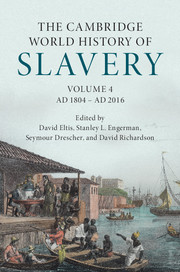Book contents
- The Cambridge World History of SlaveryVolume 4: AD 1804–AD 2016
- The Cambridge World History of Slavery
- The Cambridge World History of Slavery
- Copyright page
- Contents
- Maps
- Figures
- Tables
- Contributors
- Series Editors’ Introduction
- Part I Overview
- Part II Slavery
- Part III Abolition
- Part IV Aftermath
- Index
- References
Part III - Abolition
Published online by Cambridge University Press: 20 April 2017
- The Cambridge World History of SlaveryVolume 4: AD 1804–AD 2016
- The Cambridge World History of Slavery
- The Cambridge World History of Slavery
- Copyright page
- Contents
- Maps
- Figures
- Tables
- Contributors
- Series Editors’ Introduction
- Part I Overview
- Part II Slavery
- Part III Abolition
- Part IV Aftermath
- Index
- References
Summary

- Type
- Chapter
- Information
- The Cambridge World History of Slavery , pp. 319 - 510Publisher: Cambridge University PressPrint publication year: 2017



